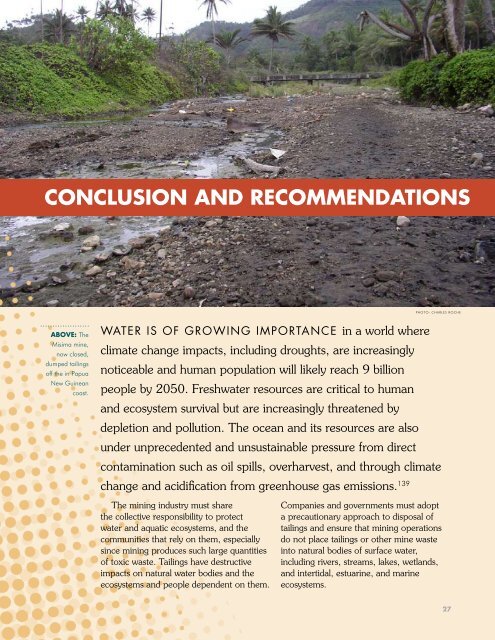Troubled-Waters_FINAL
Troubled-Waters_FINAL
Troubled-Waters_FINAL
Create successful ePaper yourself
Turn your PDF publications into a flip-book with our unique Google optimized e-Paper software.
EARTHWORkS EARTHWORkS AnD miningWATcH AnD miningWATcH cAnADA cAnADA | 2012<br />
cOncLUSiOn AnD REcOmmEnDATiOnS<br />
ABOvE: The<br />
Misima mine,<br />
now closed,<br />
dumped tailings<br />
off the in Papua<br />
New Guinean<br />
coast.<br />
WaTer is of groWing iMPorTanCe in a world where<br />
climate change impacts, including droughts, are increasingly<br />
noticeable and human population will likely reach 9 billion<br />
people by 2050. Freshwater resources are critical to human<br />
and ecosystem survival but are increasingly threatened by<br />
depletion and pollution. The ocean and its resources are also<br />
under unprecedented and unsustainable pressure from direct<br />
contamination such as oil spills, overharvest, and through climate<br />
change and acidification from greenhouse gas emissions. 139<br />
The mining industry must share<br />
the collective responsibility to protect<br />
water and aquatic ecosystems, and the<br />
communities that rely on them, especially<br />
since mining produces such large quantities<br />
of toxic waste. Tailings have destructive<br />
impacts on natural water bodies and the<br />
ecosystems and people dependent on them.<br />
PHOTO: CHARLES ROCHE<br />
Companies and governments must adopt<br />
a precautionary approach to disposal of<br />
tailings and ensure that mining operations<br />
do not place tailings or other mine waste<br />
into natural bodies of surface water,<br />
including rivers, streams, lakes, wetlands,<br />
and intertidal, estuarine, and marine<br />
ecosystems.<br />
27


